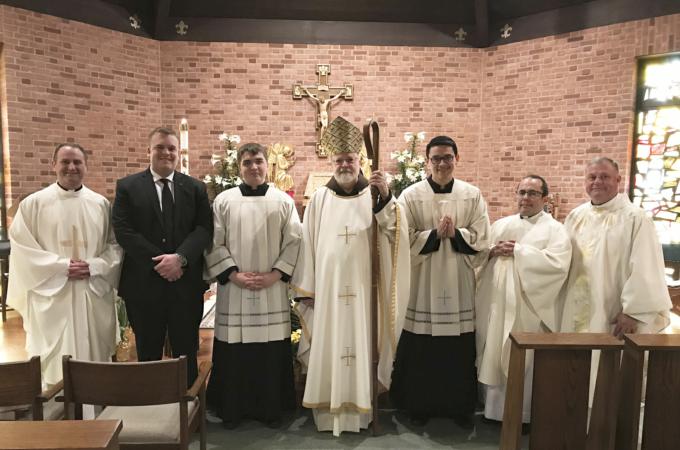From Cardinal Seán's blog
This week we marked the 50th anniversary of the assassination of Dr. Martin Luther King, Jr. Of course, there were many observances throughout the country. I was very pleased to have been able to attend the breakfast here in the archdiocese for the Martin Luther King holiday, where many people who knew Dr. King personally were present, and some of the early activists in the civil rights movement gave beautiful testimonies.
The assassination of Dr. King is one of those events that make such an impact on a person that they always remember precisely where they were when they heard the news. For myself, I was returning to Capuchin College from St. Matthew Cathedral in Washington, D.C., where I had been teaching ESL classes to Hispanic immigrants, and I had some ladies in my car who I was going to drop off at their homes. But, when we came up 14th Street, we found ourselves in the middle of riots with fires, looting and people throwing stones at cars. It was a very terrifying experience particularly because, in that moment, we had not yet realized what happened. However, the people were respectful of the clergy, so they allowed me to pass by, although it was a very harrowing event. I thought for sure that something terrible would happen to us.
When we got back to Capuchin college, we went to the tower, which is the highest point in Washington, and from there we could see the more than 700 fires burning in the city.
What is more, the White House was surrounded by tanks and there were soldiers with bayonets on every street corner. It was a very frightening time. It was very sad that a man whose life was dedicated to nonviolence should perish in such a violent way and then to have that violent reaction afterward, but clearly, it was a result of people's utter frustration.
Dr. Martin Luther King made an incredible contribution to our country and, although the work of overcoming racial prejudice is far from over, the advances that came about because of his life and ministry -- and ultimately the sacrifice of his life -- has made an extraordinary difference in the history of the United States. It is particularly comforting to realize that it was his Christian faith and his devotion to the word of God that was the deepest motivation of his life. His was not a political stance but simply the manifestation of his belief that every human being is made in the image and likeness of God, is a child of God, and that we all have a responsibility to care for each other and respect each other. So, after 50 years we are still filled with gratitude for the extraordinary sacrifice of his life and all that he did.
Bishop Mark's mother's funeral
Tuesday, I went to attend the funeral of Margaret O'Connell, the mother of Bishop Mark O'Connell, at Most Precious Blood Parish in Dover. She died on Palm Sunday, just a few days shy of her 92nd birthday.
Mrs. O'Connell's had a brother who was a priest of the archdiocese, Father David Delaney, as well as a sister who is a nun, Sister Jean Delaney, OP, who was present with us.
Bishop Mark gave a beautiful homily and reflection at the Mass. It was a wonderful testimony to her faith, her devotion to the Church and her family.
While I was at Most Precious Blood, I was struck by this photo, which is the in sacristy, which shows a Mass being celebrated in a home in Ireland during the time of the persecution. Normally, of course, they would have had Mass in the churches, but during the time of the persecution, they had Mass out in the countryside or in people's cottages. At Christmastime, they used to put a candle in the window, which was an invitation to a priest who was in hiding to come and celebrate Mass there.
This is, for me, just a reminder of the fact that people have suffered religious persecution in the past and are still suffering in different parts of the world today.



















